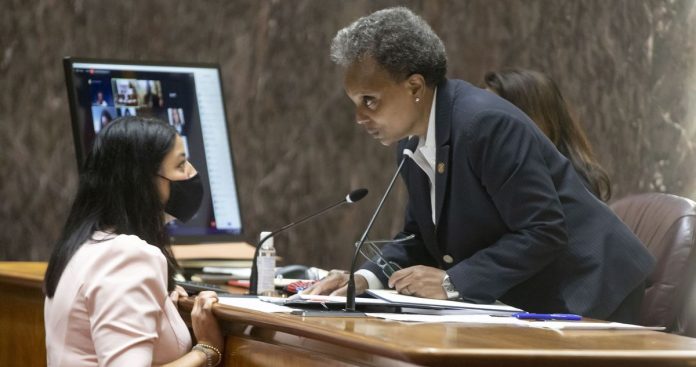While you may be able to enjoy alcohol at a bar or restaurant in Chicago after 10 p.m., you might not be so lucky to find any in a liquor store after 10 p.m. Chicago Mayor Lori Lightfoot recently proposed a permanent curfew ending alcohol sales after 10 p.m., noting that it is a public safety issue and created “quality of life” issues for residents.
Lightfoot presented a 94-page ordinance to the City Council and said there were calls from council members and the Chicago Police department surrounding services of the many packaged good stores. The proposal comes just days after hundreds of protesters gathered outside her home to express their displeasure with her job performance as Mayor.
The protest even included liberal community organizers such as the Chicago Teachers Union, Black Lives Matter Chicago, Illinois Raise Your Hand and GoodKids MadCity.
“For the past 2 years, Lightfoot’s administration has continued to ignore the demands of its people. This administration has failed on multiple issues — from environmental justice to education to policing to housing and COVID recovery. Join over 30 organizations in calling out Mayor Lightfoot on her [two-]year anniversary and demand that she fulfill her broken promises,” the protest event page said.
Lightfoot’s proposal would ban sales of packaged liquor products between the hours of 10 p.m. and 7 a.m. every day except Sunday when they’d start at 8 a.m. Chicago liquor stores were able to sell packaged alcohol until 2 a.m. Sunday through Friday and until 3 a.m. Saturday prior to the pandemic.
“Acknowledging the real quality of life issues that sometimes creep up with these businesses. Loitering and you have other illegal activity that happens around them,” Lightfoot said.
But liquor stores in the city said it was a “low blow” after struggling through the pandemic. Noble Square Ashland Market owner Ali Thabet said the proposal would drive all of the alcohol sales out of Chicago and kill small businesses. He said it would hurt the industry for the long run and that he would likely have to cut staff.
John Mourikes, a grocery store owner in the Logan Square neighborhood near the mayor’s home, said the ordinance would kill sales, especially since they cater to people who work late shifts. “You don’t lose just your liquor sales. If someone can’t get the alcohol too, they are going to go somewhere else to shop,” he said.
Tanya Triche-Dawood of the Illinois Merchants Association said the city can’t end the sale of alcohol for everyone at 10 p.m. because every business, bar, restaurant, and craft brewery has the license to do so. She said that the mayor was unfairly lumping a handful of irresponsible packaged alcohol sellers with the rest and that the ordinance would devastate already-struggling businesses.
While the City Council blocked the ordinance, it could still be reworked and voted on in future meetings. Mayor Lightfoot said she expects it to be a “robust debate and discussion,” but that it’s a real issue that can’t be ignored.
Texas, on the other hand, just passed a bill making alcohol delivery permanent. Gov. Greg Abbott shared in a video that they waived regulations during the pandemic to let restaurants sell alcohol to-go. He said that Texans liked it so much to help restaurants survive during the pandemic that they wanted to make that law permanent.
The difference between democratic and republican leadership is clear as daylight – one wants to help small businesses, the other wants to suffocate them. What’s next? The prohibition of alcohol?


